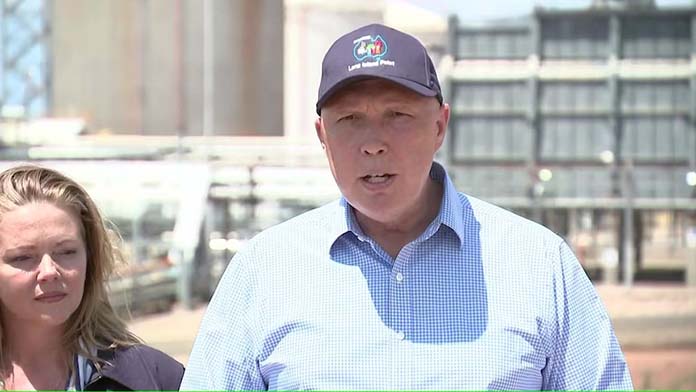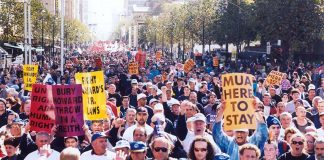Peter Dutton is leading the Liberals into disaster. His decision to campaign for a No vote against an Indigenous Voice to Parliament is a further sign he wants to keep the party well to the right.
The Liberals’ defeat in Aston was the first time an opposition had lost a seat to the government in a by-election in 100 years. Following the NSW election, Labor now holds power federally and in every state and territory except Tasmania. The Coalition lost a humiliating 19 seats at last year’s federal election—including a series of Liberal heartland seats in Sydney, Melbourne and Perth to teal independents.
Dutton’s position on the Voice to Parliament, and the obvious racism behind it, has lost them further support. So called moderate Liberals are squirming.
Ken Wyatt, the Coalition’s Indigenous Affairs Minister until the last election, resigned from the party in disgust.
Julian Leeser has resigned from shadow cabinet and other moderate Liberals, including Andrew Bragg and Bridget Archer, are preparing a Liberals for Yes campaign.
Not a single Liberal state leader would support Dutton, with Tasmanian Premier Jeremy Rockliff promising to campaign “vigorously” for a Yes vote, and Liberal and National leaders in Queensland and Victoria saying they still had an “open mind” on the issue.
The Voice to Parliament was designed as a powerless advisory body that would be acceptable to conservatives and the Liberal Party. The concept was put together in consultation with Julian Leeser and others by conservative Indigenous leader Noel Pearson.
The proposal is so limited that it already has wide backing even among the Liberals’ traditional supporters.
Major corporations, from mining companies BHP and Rio Tinto to NAB, the Commonwealth Bank, ANZ, Wesfarmers, Woolworths and Coles are all behind it. The Yes campaign has already raised “tens of millions” from big companies and corporate foundations, the Sydney Morning Herald reported in March.
They all recognise that a Voice poses no threat to mining development or corporate profits whatsoever.
The major sporting codes are on board too—with the AFL, NRL, Rugby Australia, Football Australia, Cricket Australia and Tennis Australia all planning to promote a Yes vote.
Trade unions, local councils and NGOs will campaign for Yes. Despite polls showing backing for the Voice has dropped, support is still at almost 60 per cent.
Hard right
Dutton’s stance on the Voice follows his blanket opposition to Labor’s climate Safeguard Mechanism. Business leaders and the Financial Review urged the Liberals to support the changes, confident they would do little to prevent new coal and gas projects or harm company profits.
But Dutton was determined to stand against any suggestion of action on climate change.
After Victorian Liberal Moira Deeming joined Kellie-Jay Keen-Minshull’s anti-trans rally Dutton also remained silent, refusing to stand up against transphobia.
He wants to keep his party on the hard right, refusing to break with Scott Morrison’s legacy even after it was decisively rejected at last year’s election. This is a recipe for keeping the Coalition marginalised. It appeals to Liberal Party members and a section of its support base. But it makes winning back the Liberal seats won by teal independents impossible—and will consign the Coalition to at least two terms out of office.
If the Voice referendum succeeds Dutton will be further discredited.
He has justified his approach as necessary to hold the Liberal Party together after its shattering election defeat. The loss of many so-called moderate Liberal MPs has left the party a hard right rump. Its caucus of federal MPs is now skewed far to the right—dominated by those from Queensland and WA, who support Dutton’s reactionary approach.
The Liberals’ woes have created enormous space for Labor to campaign for real change. They could scrap the stage three tax cuts and other handouts for the rich, increase spending to expand public housing and build publicly-owned renewable energy, as well as put an end to new fossil fuel projects.
Instead Anthony Albanese wants to appease big business and the rich in order to position Labor as dependable managers of the system. He has refused to increase his inadequate climate target, produced a hopeless Safeguard Mechanism that will do nothing to make companies reduce emissions, and is resisting pressure to increase public spending while committing $368 billion to buying nuclear submarines.
He has failed to act on shocking rates of Indigenous incarceration, deaths in custody and child removals, while backing mining companies like Santos as they move to override Indigenous native title rights.
Labor is more interested in occupying government for as long as possible than in delivering any real change. It is going to take a fight outside parliament on the streets and in the workplaces to force any shift.
By James Supple






